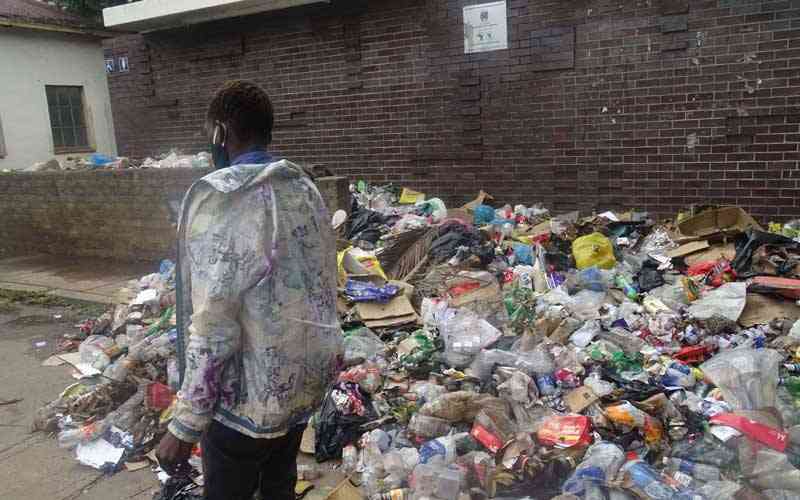
IT is evening in Harare's central business district.
Almost everyone is calling it a day and prepare to retire back home. A bit of exciting “conflict” between shoppers and retailers arise, with customers' buying power seemingly soaring suddenly, yet the shop owners have no choice but to close.
As the shoppers frantically hop from one shop to the next, they are told this shop, the next and that one as well are closed although the doors are still wide open.
As shop owners begin cleaning their shops and putting the litter in some makeshift litter bins (it has been ages since the council provided the trash cans), a new troop of “business people” starts roaming the streets in search of recyclable waste as yet another noisy army of enterprisers — vendors — also fast get ready to set up shop on street pavements.
The street trash collectors ruefully watch as some shop owners carry their litter with them in their cars, perhaps to throw it away somewhere in city open spaces on their way home, piling up more headache for a council that appears to have all but failed to manage the capital city’s massive load of waste.
A shop owner along the city’s Chinhoyi Street, Mai Juju, places her makeshift bin on the tarmac preparing to place it into her car. As she unlocks the car, a youth clad in oily dirty clothes carrying a huge litter bag on his shoulder suddenly appears, approaches the bin and starts carelessly ransacking it, completely oblivious of everyone around him.
Disarmed and almost shocked, Mai Juju powerlessly stares at the young man. For a moment she is transfixed, torn between dismissing the rude boy as some mentally ill person or one of the usual unmannered mugundurus (street kids) who have literally overrun the capital.
Unperturbed, the teenager continues to thoroughly rummage through Mai Juju’s bin, scattering everything he was not interested in on the tarmac to select his desired loot. He appears to be in ninth cloud each time he finds an empty container of maheu (fermented mealie-meal porridge), or something else of that nature. He aims at plastic containers, most probably the poly (p-phenylene ether) (PPE), an amorphous high-performance plastic whose glass transition temperature is 215 °C.
- Byo armed robber in court
- Woman jailed 12 years for indecent assault
- Magistrate jailed 3 years for abuse of office
- Zim’s poor batting hands India series
Keep Reading
As he leaves, another man, also shabbily dressed follows in a similar fashion and picks a different set of litter: Plastic bags and other plastics commonly known as PE-LD, regarded as one of the most valuable plastic packaging materials in the world and the number one most recycled polymer in, for instance, South Africa.
The plastic is, however, not biodegradable, but recyclable.
The makeshift bin is finally left virtually empty. A few minutes later the makeshift cardboard box bin vanishes after another collector whisks it away. All waste has been collected at no fee. A few biomass junk remains on the tarmac as pedestrians, in their panicky hurry to escape an evening downpour as they head back home, kick and squash the biodegradable waste that is soon consumed by a heavy rain flood.
As the biomass washes away down the drain one could not but rue the opportunities a city such as Harare is missing each passing day to turn into biogas energy all the thousands of tonnes waste being thrown away by the metropolitan’s nearly three million inhabitants.
For Mai Juju, her waste disposal problem solved, shrugs her shoulders as she drives off in the heavy downpour.
For today she has escaped the risk of being caught illegally dumping waste and as for the streetwise trash collectors their “day” has just begun as they comb the capital offering an otherwise invaluable service of helping humanity escape the climate calamities posed to future generations by poor waste management.
Harare offers some very interesting insights into the waste management dilemma facing many developing nations.
Litter collectors appear to be the common street people, but they are nowhere within that clan. They mean business, but their efforts have hardly been noticed or appreciated despite indirectly cleaning the so called sunshine city and at the same time eking out a living from the tossed litter. To get a living wage, they have to gather tonnes and tonnes of their desired matter and even more tonnes given the poor prices offered for their break-breaking picks.
Gathering litter is a cumbersome exercise, but doing it during the evening or wee hours, when it is cooler and there is less traffic on the streets makes life easier for the trash hunters.
The buyers want the material that is chipped into small granules, either as pellets or simply chipped material. Additionally, the material must be screened in terms of quality and colour, a task not for the weak. The collectors have to sell their pick to those with chipping machinery, which is scarce, pointing to more opportunities being missed in an economy that is tottering on the brink of collapse owing to years of poor investment.
After chipping, the material goes through the sedimentation process to remove the unwanted material such as dust and other plastic that is of inferior quality. This choice material is then sold to manufacturers of plastic products, and again, the prices prescribed at the market are quite discouraging.
While the Zimbabwe government has departments that can come on board and help recognise the importance of these informal city cleaners, none of them have been fighting in the silent environment conservationists’ corner.
A plastic recycling agent based at Chikwanha shoping centre in Harare’s dormitory town of Chitungwiza, Edward Nyirongo: “We are not only reducing waste, but also adding something to the economy. Our role should be recognised by the government since a clean environment is a right for everyone. We collect tonnes and tonnes of this waste on a daily basis. Imagine if that waste is not collected,” Nyirongo said.
“Our contribution to the manufacturing industry is also magnificent. That should not be overlooked. The plastic manufacturing industry is growing in Zimbabwe, although the manufacturers, mainly Chinese proprietors, are paying us peanuts.”
Perhaps these people should also stand up for their rights as other marginalised groups such as women, children and people with disabilities and workers who have stood their ground to demand recognition. It means they have to organise themselves into one solid associations or union that will advance their cause.
But, in the interim, like ghosts in the shadows, the waste scavengers have to continue toiling on the streets to eke out a living in an economy that is all but heading south.
- Follow us on Twitter @NewsDayZimbabwe









